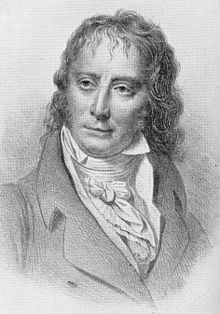Benjamin Constant
| Benjamin Constant | |
|---|---|
 |
|
| Born | Henri-Benjamin Constant de Rebecque 25 October 1767 Lausanne, Switzerland |
| Died | 8 December 1830 (aged 63) Paris, France |
| Occupation | Writer, politician |
| Nationality | Swiss French |
| Alma mater |
University of Edinburgh University of Erlangen-Nuremberg |
| Genre | Novel, essay |
| Literary movement | Romanticism |
| Notable works | Adolphe (1816) |
| Partner | Germaine de Staël |
Henri-Benjamin Constant de Rebecque (French: [kɔ̃stɑ̃]; 25 October 1767 – 8 December 1830), or simply Benjamin Constant, was a Swiss-French political activist and writer on politics and religion. He was the author of a partly biographical psychological novel, Adolphe. He was a fervent liberal of the early 19th century, who influenced the Trienio Liberal movement in Spain, the Liberal Revolution of 1820 in Portugal, the Greek War of Independence, the November Uprising in Poland, the Belgian Revolution, and Liberalism in Brazil and Mexico.
Henri-Benjamin Constant was born in Lausanne to descendants of Huguenot Protestants who had fled from Artois to Switzerland during the Huguenot Wars in the 16th century. His father, Jules Constant de Rebecque, served as a high-ranking officer in the Dutch States Army, like his grandfather, his uncle and his cousin Jean Victor de Constant Rebecque. When Constant's mother died soon after his birth, both his grandmothers took care of him. Private tutors educated him in Brussels (1779) and in the Netherlands (1780). At the Protestant University of Erlangen (1783), he gained appointment to the court of Duchess Sophie Caroline Marie of Brunswick-Wolfenbüttel. He had to leave after an affair with a girl, and moved to the University of Edinburgh. There he lived at the home of Andrew Duncan, the elder and became friends with James Mackintosh and Malcolm Laing. When he left the city, he promised to pay back his gambling debts.
...
Wikipedia
